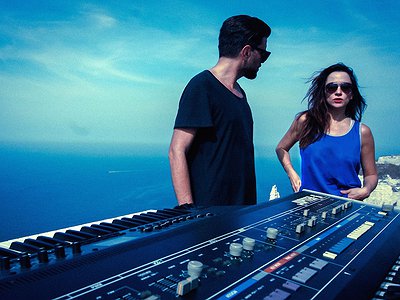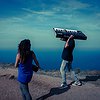Name: Rodriguez Jr. & Liset Alea – RJLA
Nationality: French, Cuban-American
Occupation: Producers, Songwriters, Singer
Current Release: "Radio" on Mobilee
Recommendations: Liset: Mikhail Shishkin, Calligraphy Lesson (Collected Stories)
Rodriguez: Pierre Schaeffer, Treatise on Musical Objects
Website / Contact: If you enjoyed this interview with Rodriguez Jr. & Liset Alea, visit their facebook pages for more information. Click here for Rodriguez Jr. and here for Liset Alea. They also have a dedicated webspace for their RJLA project.
When did you start writing/producing music - and what or who were your early passions and influences? What is about music and/or sound that drew you to it?
R: I began in the 90’s, at first it was a love for synths and machines and bands such as Depeche Mode, Jarre, Kraftwerk, the Cure.
L: It was the tapestry of dreaminess that these sounds created, I was very much into Cocteau Twins and This Mortal Coil etc, darker sounding esoteric stuff, primitive and futuristic …as if it were the soundtrack to a nearby future … which it was.
For most artists, originality is first preceded by a phase of learning and, often, emulating others. What was this like for you? How would you describe your own development as an artist and the transition towards your own voice? What is the relationship between copying, learning and your own creativity?
L: My sense of unique sound comes from the work a singer must do to discover her voice, emulating singers like Kate Bush and Gal Costa gave me a technical challenge which led to my own sound.
R: It’s a bit the same for me, I dissect the sound in order to understand the craftsmanship behind it, kind of like my personal obsession with dismantling electronic equipment, just to put it back together and see how it’s done. I do it with ceiling fans, as I do it with Transeurope Express.
L: By copying you can physically hurt your voice, stretching yourself to areas that are not meant for you. But by doing so you find your own territory.
What were your main compositional- and production-challenges in the beginning and how have they changed over time?
L: For me it’s repeating myself. Like I get obsessed with telling a story and I used to tell the same one in many different ways, until I started to actively seek out more creative narratives, which led to more adventurous melodies, also playing with breaking the traditional rules of songwriting.
R: For me the most difficult part has been allowing for space, to remove elements and hone in on the right ingredients, as opposed to adding random layers in order to fill the space.
What was your first studio like? How and for what reasons has your set-up evolved over the years and what are currently some of the most important pieces of gear for you?
R: My first studio was an Atari computer, a bunch of synths (like the Roland JD800). This is how I learned audio synthesis and some fundamental skills of production. And even today I love this challenge of producing things with very little, it pushes your creativity.
L: My first studio was Studio Projects B mic (cheap copy of a Neuman u87) lots of random pieces of paper and Garage Band. My Technical limitations made me come up with many vocal ideas as background layers, since I didn’t have midi keyboards or the ability to use samples easily as I do now.
R: I still use a lot of hardware equipment because this is how I learned the craft and it’s very important and fun to have a physical connection with the machines. It’s like being physically connected to the sound?
How do you make use of technology? In terms of the feedback mechanism between technology and creativity, what do humans excel at, what do machines excel at?
L : Well now I have a range of fantastic drummers available for sessions constantly in Logic X. It’s great to get something that sounds solid very quickly when a melody comes to mind. I can write over a beat. Remember that album by The Creatures featuring drum and vocal duo by Siouxsie and the Banshees members Siouxsie Sioux and Budgie. That’s always been a reference for liberation of a melody. Does it work over a beat?
R: Technology is not a finality it’s a vector, it is after all just an instrument. It’s 2018, so far humans still excel at making emotional choices … but that may change. Electronic instruments allow humans to create sounds independently of the acoustic reality.
Production tools, from instruments to complex software environments, contribute to the compositional process. How does this manifest itself in your work? Can you describe the co-authorship between yourself and your tools?
R: My tools are just an extension of myself. As complex as the tools may be, it’s like driving a car. When you drive a car you don’t think about how it works, you just push the buttons. In the end it should remain an instinctive process.
Collaborations can take on many forms. What role do they play in your approach and what are your preferred ways of engaging with other creatives through, for example, file sharing, jamming or just talking about ideas?
L: I’ve collaborated in many different ways, with Alex Kid for example when we wrote "Come With Me", he sent me a short loop on a CD and I wrote the whole song to it sitting on my bed, then came into the studio and put it down, apparently in one take (as he tells me now). I’ve recently gotten really into improvising live, listening back to what happened in the moment and structuring a song around that, in efforts to reign in an organic moment. With Rodriguez Jr. on Baobab, when he asked me to come and sing on his album, I specifically asked to work live, I did not want files over the Internet. I was getting bored of this and was missing the human interaction. Turned out to be the best decision of my life haha.
Could you take us through a day in your life, from a possible morning routine through to your work? Do you have a fixed schedule? How do music and other aspects of your life feed back into each other - do you separate them or instead try to make them blend seamlessly?
R: Wake up, make coffee for Liset, emails, studio, afternoon beer, repeat. It’s very difficult to have a normal rhythm with the traveling, but nonetheless we try to create a discipline because studio work requires a lot of time.
L: We live together so obviously music and daily life intertwine. The music we make now is like a soundtrack to our lives, we feed off things we live and things we talk about. We each have our own studio so after a big pot of coffee we go into our studios and I will work on my end of things while Rodriguez works on vocals and compositions. We meet in a Dropbox.



